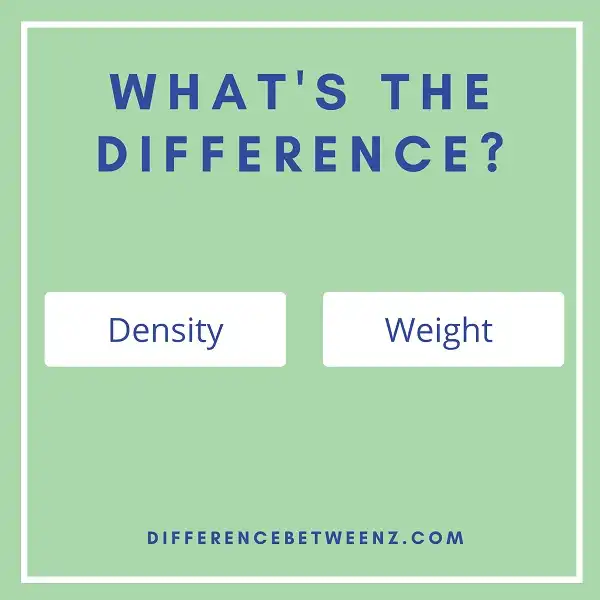What’s the difference between density and weight? Density is the measure of how much matter is in a given space, while weight is the measure of how much force is applied to an object. This can be confusing for some people, so let’s explore the difference between these two concepts in more detail.
What is Density?
Density is a measure of how much matter is contained in a given volume. It is usually expressed in terms of grams per cubic centimeter. The denser an object, the more mass it has in a given volume. Density is an important property of matter because it affects many other properties, such as the object’s weight, its resistance to motion, and its ability to float in a fluid. Density can also be used to identify a substance; for example, gold is much denser than most other metals. Densities can vary depending on the temperature and pressure of the material, but they are typically constant for a given substance at a given temperature and pressure.
Density is an intensive property, meaning that it does not depend on the amount of material present. A gram of gold has the same density as any other gram of gold, regardless of how much gold there is in total. Density is usually measured in units of grams per cubic centimeter, but it can also be expressed in pounds per cubic inch or kilograms per cubic meter. Density is an important concept in many fields, including physics, engineering, and geology.
What is Weight?
Weight is a measure of the force of gravity on an object. The unit of weight is the Newton, which is abbreviated “N.” Weight is measured with a spring scale or a balance. On Earth, an object’s weight is the product of its mass and acceleration due to gravity, which is 9.8 m/s2. Weight is different from mass because mass is a measure of how much matter is in an object, while weight is a measure of the force exerted by gravity on an object. Weight is also different from the volume, which is a measure of how much space an object occupies. Weight can be affected by factors such as gravity, but the mass remains the same no matter where an object is located.
Difference between Density and Weight
Density and weight are often used interchangeably, but they are actually two different measures. Density is a measure of the mass of an object per unit of volume. Weight is a measure of the force exerted by gravity on an object. An object with a high density will have a high mass per unit of volume. An object with a high weight will feel heavier because it is being pulled down by gravity. Density is usually measured in grams per cubic centimeter, while weight is usually measured in Newtons. Density can be affected by factors such as temperature and pressure, while weight is simply the force exerted by gravity on an object. When comparing two objects, density is a more accurate measure of mass than weight.
Conclusion
In conclusion, while density and weight may be related, they are not the same. Weight is a measure of how much force is applied to an object, while density is a measure of how tightly packed the atoms or molecules are in an object. This means that two objects can have different weights but the same density or two objects can have different densities but the same weight. Knowing the difference between density and weight can help you choose the right materials for your projects and understand why certain materials react differently to forces.


